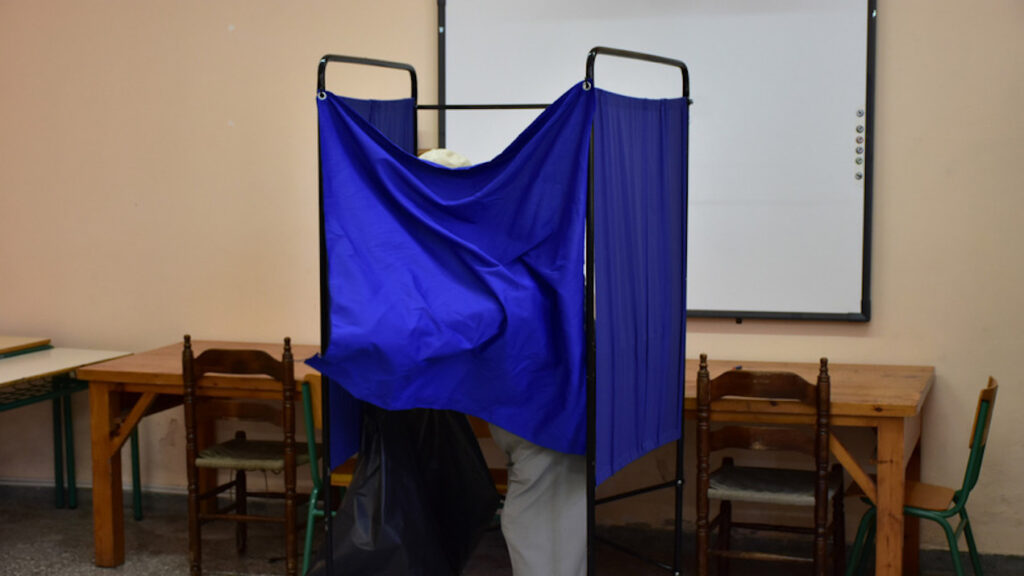Greeks are casting their ballots on 21 May in one of the most unpredictable national elections in years, with the formation of a new government uncertain and the leading politicians bickering over the credibility of current opinion polls that favour the ruling conservatives.
The election will be held under new electoral law, applying a proportional system in the first round, and analysts estimate that a party seeking to govern alone would need to get 46% of the overall vote, which is difficult.
Otherwise, the single strongest party will have to negotiate with others to form a coalition government, something somewhat unusual in Greek politics.
The three main parties in the running are the ruling New Democracy party (EPP), the main leftist opposition Syriza party (EU Left), and the socialists (Pasok – S&D).
New Democracy prefers a single-party government, while Syriza has clarified that it aims for a “progressive coalition” with the socialists.
Pasok, for their part, is expected to play the kingmaker’s role, but the party has kept its cards close to the chest, although their electoral program is much closer to that of Syriza’s.
New Democracy and Syriza are considered the two ideological opposites, and any collaboration between them is ruled out.
If negotiations for a coalition government fail, a second round will be held in July, where a party or parties will need almost 37% of the vote to form a government.
Depending on its performance, the first party will get some “bonus” seats redistributed from those who do not cross the threshold.
The heated debate over polls
New Democracy has so far been leading all polls published on national media.
According to EuropeElects, which provides the average of national polls, New Democracy could get 36.6% of the vote in the first round, followed by Syriza at 29.5% and Pasok at 10.3%.
Syriza has recently called for more transparency of the pollsters, asking them to publish the primary data of their surveys. However, such a proposal was rejected by both New Democracy and the Association of polling companies.
“Don’t look at the polls”, Syriza chief Alexis Tsipras recently told his supporters during a speech in Thessaloniki.
Government spokesman Akis Skertsos replied that questioning the polls is a tactic of losers.
Syriza insists that it is not possible for the ruling party to see its support increasing, especially just a couple of weeks after a deadly train crash that killed 57 people and angered the nation.
It is not the first time that the issue of polls is being discussed in Greece.
For example, all polls massively failed to project the result of the 2015 Greek referendum and have not managed to predict with relative accuracy the electoral performance of Syriza in several successive votes.
Some analysts suggest that the problem may be structural, considering that the polling methodology followed in Greece focuses mainly on landlines, and companies consequently fail to identify the younger and more progressive voters.
The ‘poll of the polls’
At the same time, multinational companies operating on the Athens stock exchange conduct their own polls with the traditional and more costly ballot methodology, i.e. by completing a questionnaire in person.
They also use special algorithms to analyse the published results of other polling companies, taking into account the deviations they showed in previous election periods and assigning them the corresponding accuracy coefficient.
To some extent, the process resembles the poll of polls by specialist US agencies such as FiveThirtyEight.
EURACTIV was shown one of these polls, which was handed over last Friday (12 May) to C-level executives of the company that commissioned it, but also to influential European actors.
The estimates differ significantly from the published polls, showing a neck-and-neck race between the New Democracy and Syriza.
Yet, the projections clearly indicate that there is little chance for either of the two to form a coalition government with the third-placed party after the first round.
Yet, this methodology’s assessment of the election result is in the number of votes.
According to this poll, New Democracy is estimated to get 1.890.000 votes, followed by Syriza with 1.860.000 votes and Pasok with 510.000 votes.
The abstention rate corresponds to the previous Greek national elections held in July 2019.
Greece is one of the EU countries with the highest nominal abstention (42% in 2019), but it is difficult to assess to what extent this percentage corresponds to reality since the electoral rolls are rarely updated.
However, it is estimated that a possible reduction in abstention is in the interest of Syriza since most abstainers are typically younger citizens.
According to a survey conducted by Eteron Institute for Research and Social Change, approximately 430,000 Greek young voters will play a decisive role in the next elections.
The conservative government has responded negatively to calls by all opposition parties for young people who will be away from their constituency – mainly those employed in seasonal work – to participate in the elections.
Brussels stance
Meanwhile, EU officials have adopted a “wait and see approach” but are anything but certain that a government will be formed after the first round.
EURACTIV was informed that due to the uncertainty over the Greek vote result, and the possibility of having only a technical government in place next Monday, the European Commission wants to speed up the adoption of a new EU sanctions package against Moscow this week before the Greek election.
According to insiders, Athens, keen to protect its lucrative shipping industry, has raised reservations over the proposed sanctions related to shipping, and any further talks could significantly delay the adoption of the new package.
It is, therefore, crucial to reach a compromise this week, an EU diplomat told EURACTIV.
(Sarantis Michalopoulos – Edited by Zoran Radosavljević, Benjamin Fox | EURACTIV.com)
